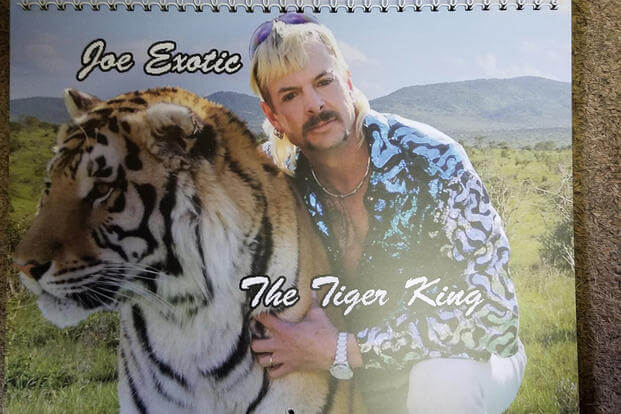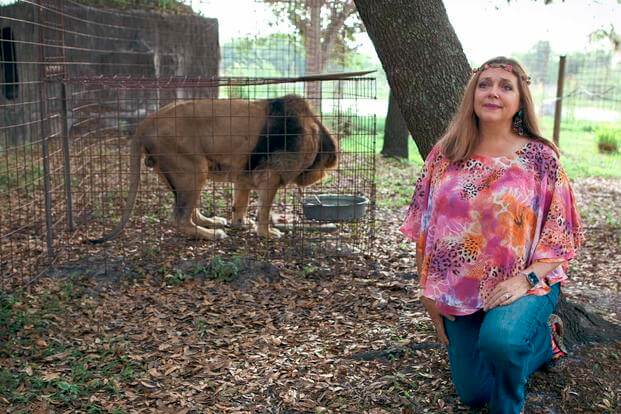
Everyone is talking about “Tiger King: Murder, Mayhem, and Madness,” a new Netflix documentary series about Joe Exotic, the flamboyant owner of a private Oklahoma zoo that featured large cats, among other animals.
The wildest animals, it turns out, weren’t in the cages, but were the owners themselves. Nonetheless, these zoo owners, as eccentric as they are, ran profitable businesses for a long time, and there’s something to be learned from both their success and their downfall.
When you’re getting out of the military, striking out on your own is a daunting idea. And the thought of running a business if you’ve never done it and have no experience can be downright terrifying. But you aren’t the first separating veteran who wanted to take this path.
And if there’s anything “Tiger King” Joe Exotic showed us (and he showed us a lot), it’s that where there’s a will, there’s a way.
1. Anyone Can Do It
Joseph Allen Schreibvogel, aka Joe Exotic, may seem like a lunatic to viewers, but remember that he was able to build a multimillion-dollar business with a high overhead using simple business skills. A former Texas police officer, he ended up buying a small pet store with his brother. When that brother was killed, Joe Exotic used the settlement money to scale up his operation.
He leveraged that money — an influx of cash — to buy a ranch, which would soon become the G.W. Zoo. He then acquired the pets, which for him were essentially products, from people looking to offload products they no longer wanted. Rather than attempt to resell the product, he used it for a service that had more demand. His entire supply existed because people didn’t want to buy; they just wanted to look. Joe Exotic recognized that.
2. Do What You Love
Running a business is hard work, especially when it’s just starting out. But the old adage about doing what you love and never working a day in your life rings true. If there is one saving grace about the man who would one day become known as “Joe Exotic,” it’s that he got into the business for the right reasons: He loved the animals.

His love for those animals made him get up every morning to tend to them, feed them and maintain his considerable property, even when he had little help to do it. The same is true for any veteran business owner. Money will be tight, and the military isn’t going to help you. You’re on your own, so you better love the work.
3. Self-Promotion Is Essential
Schreibvogel didn’t become “Joe Exotic” overnight, and he didn’t change his name without a reason. When he realized his repeat business was coming from customers who wanted to see the G.W. Zoo’s wild owner as much as the wild animals, he made sure they got their money’s worth — and told their friends.
As tacky as his TV appearances, gift shops and country albums were, it made people talk about him and what he was doing. That’s called “free advertising.” Joe Exotic had billboards, commercials and whatever else he needed to advertise his business. Even with an already high overhead, he knew the value of advertising and word-of-mouth.

That’s not unique to everyone’s favorite Tiger King. For example, like Joe Exotic, Mat Best and the veterans from Article 15 Clothing didn’t just launch a T-shirt company, they started an entire lifestyle centered around the idea that maybe the way they were, the humor they liked and the way they saw the world wasn’t wrong, even if it wasn’t politically correct. They tapped into that using funny videos that made people talk — and share them with friends.
4. Invest in Yourself
Success breeds success. It’s important to capitalize on those successes whenever you can by building on what you’ve already created. When you start to become successful, make improvements to your assets or your business model. Expand. Diversify.
5. Manage Your Finances
While making certain investments is critical, so is watching your budget. It’s difficult to imagine what Joe Exotic’s total cost of doing business must have been when he was taking care of hundreds of large animals at a cost of $10,000 to $30,000 a year for each.
At first, he fed them by taking meat from the Walmart food truck and hiring workers at minimal pay to keep costs low. That worked for a time.
But watching the “Tiger King” develop, he became less and less about his company and began to use his profits outside the business. Running for president and handing out condoms with his photo on them was not going to create a good return for his business, for example.
6. Know Your Partners
No one who spends years building up their beloved business should just sign it over to someone else in order to get a quick source of temporary capital. If they do, they should at least know that person pretty well. After all, what if that person doesn’t actually have any money? Joe shows us that just because someone seems successful doesn’t mean they actually are.

Starting a business with buddies from a deployment in Afghanistan may seem like a good idea, but consider how well you really know them — and their finances. You already know you can handle the tough times together, but there’s nothing wrong with getting a good picture of how they spend and how much work they will really put into the venture.
7. Accept Responsibility for Your Failures
While Carole F—ing Baskin may have been the catalyst for a lot of Joe Exotic’s woes, in the end, it wasn’t her or her team of lawyers who finally brought him down. It was Joe’s knee-jerk reactions and poor decision-making that resulted in the total loss of his business. Even as he faced the rest of his life in jail, he discarded the wisdom of his own lawyers so he could take the witness stand and blame everyone else, one last time.

There’s a reason Jocko Willink and Leif Babin tell you that “Extreme Ownership” is the best way forward, either in a job or in business — even when people are at their absolute worst. Humility in leadership may hurt your ego and pride, but will help focus your efforts to where they’re needed most, while earning the trust of your employees and partners.
It will also keep you from hiring a hitman to kill off your competition — or feeding anyone to a tiger.





